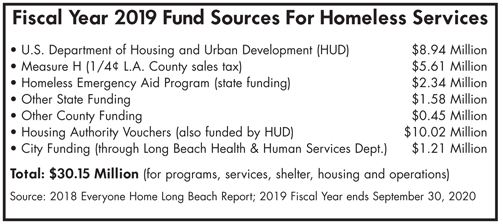The Long Beach City Council has approved the establishment of a year-round, 125-bed homeless shelter and services center located in Long Beach’s 9th Council District. The city’s $9,591,540 purchase of the property at 6841-6845 Atlantic Ave. is mostly funded with $8 million from the state. The remaining $1,591,540 is to be paid with the proceeds from the sale of city-owned property. Kelly Colopy, director of the Long Beach Department of Health & Human Services, told the Business Journal that the shelter is scheduled to open in June 2020.
The $8 million in state funding comes from the Homeless Emergency Aid Program (HEAP), a one-time block grant from the California Homeless Coordinating and Financing Council. The city is also receiving $3.4 million in funding from Measure H, a Los Angeles County sales tax for homeless services, to renovate the Atlantic property into a shelter.
“Right now it’s pretty much just a big empty building,” Colopy said. “So the $3.4 million that’s coming from the county . . . will be utilized to do the tenant improvements.” Colopy added that the city would also rely on Measure H funds to cover the shelter’s operational costs once it comes online. “The operating costs will vary by the type of services provided, and we’ll have a better feel for that as we design the shelter and services,” she said. Long Beach Economic Development Director John Keisler told the Business Journal it is likely that the city will contract with a service provider for day-to-day operations.
The city’s website notes that the shelter is expected to include “separate quarters for men, women, families and LGBTQ individuals.” It will also be “pet-friendly” and include storage. Colopy said that, in addition to the shelter, the finished property may include such services as a health clinic, a commercial kitchen and a restaurant.
The city plans to take ownership of the property by June 1, 2019, according to Keisler. The store currently located on the property, Eddie’s Liquor, will pay the city $6,000 per month in rent until the end of 2019, and store will close and the city will compensate it for up to $400,000 in unsold inventory.
Prior to the city council’s approval of the property purchase, a local political action committee (PAC), the Long Beach Reform Coalition, raised concerns about the price of the transaction and demanded the release of the site appraisal, which valued the property at approximately $7.5 million. According to the coalition, because the two parcels of land that make up the site last sold in December 2013 for $2 million, the current owners stand to make a profit of $5.5 million, or a 250% return on investment in five years.
Keisler told the Business Journal that the city intends to release the property appraisal after the close of escrow on May 31, “to protect the negotiating process.” The appraisal was conducted by Hawran & Malma, a local real estate appraiser that Keisler said is “subject to the reporting requirements defined by the Uniform Standards of Professional Appraisal Practice.”
The firm looked at 21 property sales in the area between 2016 and 2018 and determined that demand in the industrial submarket of North Long Beach is “extremely high with a vacancy average between 3-4 percent.” The 2018 city ordinance that allowed for marijuana-related businesses in the area also “significantly increased the regional value of the property.” In addition, Keisler noted at the February 5 city council meeting that the two parcels of land, totaling 99,534 square feet, included retail, industrial and residential space, which makes for a more complex calculation of fair market value.
Colopy told the Business Journal that the city’s street count for homeless individuals was 1,863 in 2017, but the actual number is greater. “We know that every year about 4,000 people fall in and out of homelessness [in Long Beach],” she said. She estimated that the city needs about 500 shelter beds to address its homeless issue, one quarter of which will be met by the new shelter.
According to the Everyone Home report released by the city’s homelessness task force in December 2018, some 20,000 households in the city are estimated to be “precariously housed,” or “one step away from homelessness.” City programs and services were able to help over 1,000 people or households to find permanent housing in 2018, Colopy said. The Everyone Home report states that Long Beach has $30 million of funding available for services, shelter, housing and operations, in Fiscal Year 2019. The majority of this funding is distributed to Colopy’s department and through the Homeless Services Division and Housing Authority.

